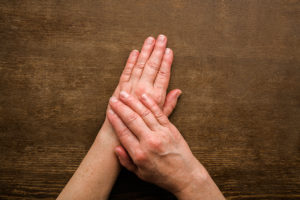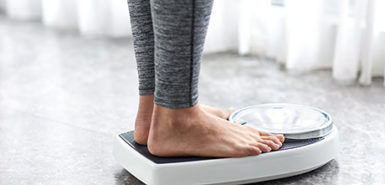
Women know the common signs to look for as they approach menopause.
Hot flashes, night sweats and missed periods.
But what about some of the more surprising, perhaps unanticipated, symptoms?
Natasha Peoples, NP, a certified family nurse practitioner with Spectrum Health Midlife, Menopause and Sexual Health Clinic, is here to help with the lesser-known but still-important impacts of menopause.
“We probably see as many patients for the other symptoms as we do for things like hot flashes and night sweats and period issues,” Peoples said. “The other things can be just as bothersome, if not more so.”
The culprit, of course, is the fluctuating level of hormones women experience as their ovaries stop producing high levels of the hormones estrogen, progesterone and even testosterone.
During perimenopause, the time period leading up to menopause, the ovaries begin to no longer release eggs. Eventually, women stop having regular menstrual cycles.
Menopause officially starts when a woman has not had a period for one year, Peoples said.
“All of the symptoms are related and they’re occurring due to the change in hormones and all the ways that affects our bodies,” Peoples said.
Top 10 lesser-known menopause symptoms:
1. Fatigue
Everyone feels tired now and again, but ongoing fatigue that doesn’t get better—even with rest—can plague women experiencing perimenopause and menopause. Many factors can contribute.
Fatigue can be caused by sleep disturbances that come from other symptoms, she said.
“The other thing we see a lot is changes in mood—and mood and energy are intertwined,” she said. “So even if you’re sleeping well, you might have a lower energy level.”
2. Sleep problems
If there’s one thing women need, especially during perimenopause and menopause, it’s a good night’s sleep. But hormonal changes can make that difficult.
It could be all the disturbances from other menopause symptoms that might wake them up—hot flashes, night sweats, even frequent urination. But even without those things, changing hormones can make it harder to sleep.
“Your brain has a harder time getting to sleep and staying asleep,” Peoples said. “Women say they lay wide awake and have a hard time shutting their brains off.”
3. Weight gain
Weight gain is one of the most frequent complaints Peoples hears from her pre-menopausal and menopausal patients.
“It’s definitely not in their imaginations,” she said. “It’s something we see quite commonly, but for a variety of reasons.”
First, if you’re not sleeping well or you’re feeling tired for other reasons—or your mood is impacted—you’re not as equipped to have a good exercise routine or make healthy eating choices, Peoples said.
But even women who maintain healthy practices might find that it takes more work to keep the pounds off. And there are biological reasons for that. During menopause, women’s bodies lose lean muscle mass and their resting metabolic rate changes, Peoples said. They become more insulin resistant.
These factors can all lead to added pounds.
4. Vaginal dryness, painful sex
Vaginal dryness is a nearly universal symptom of menopause—and it’s also one of the hardest to talk about, Peoples said. The good news is it’s also one of the easier symptoms to treat.
As a result of the body’s decreased estrogen levels during menopause, the tissues in the vagina become more dry, thin and more easily irritated.
While some women are hesitant to use hormonal therapy to treat symptoms such as hot flashes—or they’re unable to use this therapy because of a history of certain diseases— almost all women can safely use low-dose local hormonal treatments for vaginal dryness, Peoples said.
5. Bladder changes
Menopause can bring some bothersome bladder symptoms, including increased urinary tract infections, urinary frequency and even leaking.
Because the pelvic floor and bladder are connected, treatments for vaginal dryness can help with some bladder symptoms as well because they help return the pH level of the urinary tract to their pre-menopausal levels, Peoples said.
She also refers many patients to physical therapists who specialize in pelvic floor physical therapy, which helps to strengthen the pelvic floor and improve urinary leaking.
6. Dry skin
A woman has hormone receptors in every cell of her body.
Estrogen is a lubricating substance that keeps skin soft and healthy. So for the same reason women experience vaginal dryness, they also might experience dry skin everywhere, Peoples said.
“We lose the elasticity of our skin,” she said. “That’s why we also can get more wrinkles with menopause.”
7. Hair loss
Estrogen lubricates the skin and hair. With decreasing hormone levels during menopause, some women experience hair loss, Peoples said.
Hair loss might require some other testing to check thyroid levels and iron levels to rule out other causes, but menopause may be the reason for thinning hair.
8. Joint pain
Many women notice the onset or significant worsening of joint pain—particularly in the hips, knees and ankles—during menopause, Peoples said. They might think it’s just because of aging, but hormone fluctuations can contribute.
Estrogen helps reduce inflammation in the body, so as it declines in the body, inflammation increases, creating joint pain, Peoples said.
9. Brain fog
Sometimes women come into Peoples’ office convinced they are losing their memory and sure something is very wrong with them. While dementia or early onset Alzheimer’s disease are a possibility, Peoples said, it’s more likely to be menopause-related.
If you’re forgetting names, where you left your cell phone or why you walked into a room, that’s normal, Peoples said. Of more concern could be forgetting how to get home or what you ate for breakfast that day.
Eating a healthy diet, getting enough sleep and exercising regularly can help, she said.
10. Decreased libido
Look at the list of all of those menopause-related symptoms and then consider the last: decreased libido, Peoples said.
“For women, all of those things can have an impact on libido,” she said.
Decreased estrogen levels can impact a woman’s ability to be aroused, along with vaginal dryness, which can make sex painful and therefore something to avoid.
Women might also feel depressed, uncomfortable with weight gain and tired from lack of sleep.
Solutions for troublesome symptoms
Peoples encourages women who experience these or other suspected menopause-related symptoms to discuss them with their primary care physician or a specialist at the Midlife, Menopause and Sexual Health Clinic.
While hormone replacement therapy is an option, there are other lifestyle changes that could make a big difference, she said. Drinking more water, eating less sugar, getting more exercise and taking supplements can all help—it all depends on a woman’s situation.
“We are able to give each woman options that are safe for her and then find out what she wants to do,” Peoples said.
Woman should not suffer through symptoms or delay their care for any reason.
“We love to catch it when patients are in the early stages of transition,” Peoples said. “You don’t have to wait until it’s bad.”
 /a>
/a>
 /a>
/a>
 /a>
/a>